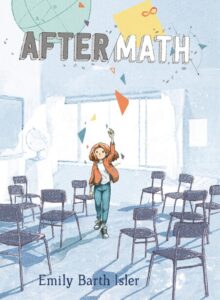For many of us, reading—and writing, for that matter!—can be a welcome escape from the stresses and anxieties and details of our everyday lives. But sometimes it is a welcome entree into a subject or topic we need to talk or think about, but don’t know how to begin approaching. For me, writing my debut Middle Grade book, AfterMath, was a little bit of both. Slipping into Lucy’s world—the fun math problems and funny math jokes, the freedom of doing an improv in mime class, the rush of a new friendship and a first crush—was a fun escape from my daily life as a stay at home mom, at the time. But the deeper subject matter of AfterMath was my entrée into activism around some of my deepest fears, and the book I needed to write to begin confronting them and how I wanted to help be the change I saw a need for in the world.
All of the characters in AfterMath are suffering from some kind of loss. Many of them are survivors of a school shooting that happened four years earlier, and Lucy and her parents are mourning the loss of Theo, her brother, from a different kind of tragedy, a congenital heart disease that caused him to die at the age of five. I am fortunate to not be a survivor of a school shooting, nor have I suffered the loss of a close family member, but I do strongly believe that it’s important for kids to have books they can read if these topics are weighing on their minds.
In this world where kids participate in Active Shooter Drills and wear masks because of Covid-19, it is unrealistic to think they’re not aware of all the natural- and human-made disasters occurring daily. It’s important that they have a way to start some conversations around things that scare them, and books are always my favorite place to start. Books allow us to paint our own mental pictures, to take in hard things a little bit at a time, and, most importantly, to try and put ourselves in the shoes of the characters—to empathize. Here are 11 books for Middle Grade (and a few for YA) readers that do a wonderful job of dealing with serious topics with grace, empathy, and sensitivity.

Towers Falling, by Jewell Parker Rhodes
As someone who lived in New York City on 9/11, and now has children who don’t really understand what happened that day and how it changed America, I’m endlessly grateful to Jewell Parker Rhodes for writing this book. Rhodes does a wonderful job balancing the storylines of friendship and family with all of the larger issues that the September 11 attacks and their subsequent social, emotional, and practical implications bring up for kids (and their families) years later.
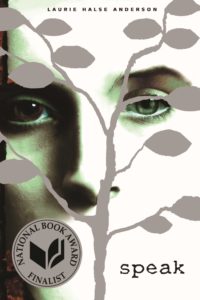
Speak, by Laurie Halse Anderson
Speak, technically a YA book, is one of my absolute favorite books of all time. Laurie Halse Anderson tells the story of Melinda, a high school freshman dealing with Post Traumatic Stress Disorder in the wake of being sexually assaulted. It’s an incredibly relatable, compassionate telling of an all-too-common occurrence. If every kid, parent, and teacher in the world would just read this book and talk about it, the world would be a much better place. I think many important discussions happen regularly as a result of this book, and highly recommend it alongside the author’s poetic memoir, SHOUT.
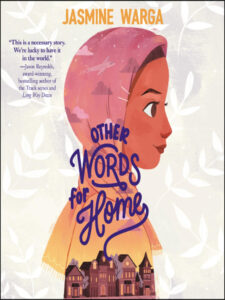
Other Words for Home, by Jasmine Warga
Other Words for Home is a novel in verse about a young girl who has to leave her home country of Syria to move to the United States. A perpetually timely story of finding oneself while navigating new circumstances, Jude is a relatable and lovable main character. We follow her from her coastal town in Syria to Cincinnati, where she and her mom live with relatives, as she misses her dad, brother, and the way life used to be, while finding new friends and hope in America.
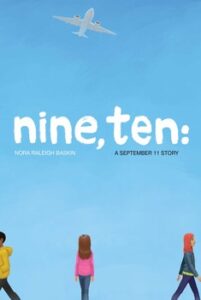
Nine, Ten, by Nora Raleigh Baskin
I very much drew inspiration from Nine, Ten when writing AfterMath, as it’s a delicate and important portrait of grief. Like Towers Falling, this book is about September 11th, but it takes place in the days leading up to the attacks in 2001. The book follows four different middle school-aged kids, offering different perspectives that encourage the reader to put themselves in others’ shoes. Tender and thought-provoking, this is a must-read.

Long Way Down, by Jason Reynolds
I also drew inspiration from Jason Reynolds’s Long Way Down when working on AfterMath as it, too, deals with the realities and implications of gun violence, loss, and grief. Told in free-verse, fifteen year old Will meets a different deceased victim of gun violence on each floor during his just-over-one-minute trip downstairs from his 8th floor apartment. This book will stay with you—it’s a gorgeously told, haunting story.

My Jasper June, by Laurel Snyder
My Jasper June takes on the difficult topics of homelessness and grief, wrapped up in a lovely story of friendship. (It made me think of one of my favorite books from childhood, Daphne’s Book by Mary Downing Hahn.) Snyder has crafted a really beautiful coming-of-age story about self-discovery and the ways we learn about the world and ourselves.

A Thousand Questions, by Saadia Faruqi
I love this story of two very different girls who are brought together one summer in Karachi, Pakistan. Saadia Faruqi tells the story in alternating perspectives, covering many societal issues and family dynamics both specific and relatably universal. The friendship at the center of the story is warm and uplifting, and the descriptions of Pakistan are wonderfully transportive.
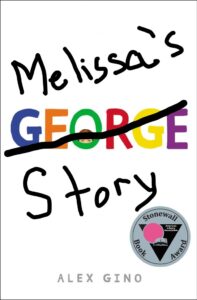
Melissa’s Story, by Alex Gino
Melissa’s Story, as it is called by the author, was originally published under the name George, just as the main character was called George before coming out as transgender. Not only is this book a wonderful introduction to the topic for Middle Grade readers, but Alex Gino has done a lot of helpful writing around how to talk about George and Melissa, including how they wish they had titled the book Melissa’s Story. Even just the discussion around the book’s deadnamed/misgendered title is helpful and eye-opening for young readers.
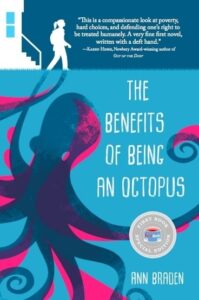
Benefits of Being an Octopus, by Ann Braden
I love Ann Braden’s writing, and this book deals so sensitively and hopefully with the issues of poverty, class, and domestic violence. I love how it, like AfterMath, features an exceptional teacher who seeks out a kid who needs them—I really appreciate books that demonstrate the power of a wonderful teacher, and show kids how to find the adults who can help them, even if that adult isn’t their parent or family member.

3 Willows: The Sisterhood Grows, by Ann Brashares
I’ve read 3 Willows many, many times. It’s a book that never fails to make me cry, but always leaves me with the best feeling of hope. Ann Brashares, author of The Sisterhood of the Traveling Pants series, tells another story of a group of girl friends, only this group has grown apart at the beginning of the story. The way the characters find their way back to each other—and find themselves in the process- is so incredibly heart-wrenching and uplifting. Set during the last summer before high school, it touches on issues of body image, parents separating, and identity.

Real Friends, by Shannon Hale and LeUyen Pham
Real Friends is a graphic novel memoir, and it and its subsequent sequels Best Friends and Friends Forever, pack an emotional punch along with entertaining stories of the author’s childhood friendships. As a parent, I appreciate so much how this book talks openly about things like anxiety, which I have used to start important discussions in my own family.
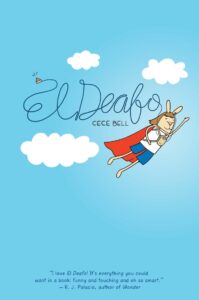
El Deafo, by Cece Bell
Another graphic novel memoir, El Deafo is Cece Bell’s telling of her own childhood story of starting at a new school with a giant hearing aid designed to help her hear her teacher in class, but which unwittingly allows her to hear the teacher all over the school. In the book she and all the other people are cleverly drawn with rabbit ears and faces, which add an extra element of fun and whimsy to this story about fitting in and standing out.
***


